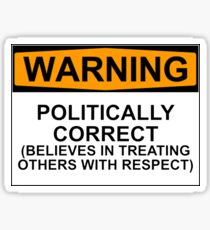 The phrase “politically correct” has been bandied around a lot lately. People either encourage it or they resent it. The people who resent it say “I used to be able to tell jokes or speak my mind freely, now I never know if what I say will offend someone.” It’s true that times are changing. Things that people used to say may not be as acceptable as they once were. People may be saying something that they think sounds innocent. It may be something they’ve always said. But suddenly out of the blue someone says “you know, what you just said may be hurtful to someone,” or “hey, that hurt my feelings.” What’s a person to do?
The phrase “politically correct” has been bandied around a lot lately. People either encourage it or they resent it. The people who resent it say “I used to be able to tell jokes or speak my mind freely, now I never know if what I say will offend someone.” It’s true that times are changing. Things that people used to say may not be as acceptable as they once were. People may be saying something that they think sounds innocent. It may be something they’ve always said. But suddenly out of the blue someone says “you know, what you just said may be hurtful to someone,” or “hey, that hurt my feelings.” What’s a person to do?
There are a number of ways we can look at why using politically “incorrect” language matters – or in some cases doesn’t matter. Here are some perspectives:
- Sometimes we don’t realize what we are saying can hurt someone. For instance, I just graduated from one of the most liberal, open-minded school programs in existence. I mean, everyone from the School of Social Work should know what to say and how to say it for all occasions, right? After all, we were learning to be counselors. The objective of a good counselor or social worker is to do and say things to make people feel safe and comfortable. You would think that everything that came out of the mouths of the teachers would be all peaches and cream, palatable for everyone. I was the oldest student by far in the entire class. I got really tired of hearing teachers say “I was teaching before you were born.” These teachers were my age, so no, they were not teaching before I was born. After I heard this a few times, I wanted to scream I AM HERE TOO. DON’T YOU SEE ME??? I felt overlooked and ignored. I already was having trouble finding my “place” because of my age. I made a lot of friends, and I loved everyone, but my fellow students were in a different place. They were just starting out, and I was starting over. These are very different approaches to life. I was feeling isolated, and these teachers, without realizing it, made me feel more isolated. Often we may not think that what we are saying is insensitive, but maybe someone is kind of hurt. We will not always know whether what we are going to say will cause some pain to others. And this is ok. No one is perfect.
- Times HAVE changed, and we do need to change with the times. Our social circles have widened. Because of this, we are surrounded by people from other cultures who think and perceive things differently. This is a GOOD thing. If we do say something that is insensitive, I think it’s best to be open and honest, and to be curious. For instance, I was at a multi-faith event a few nights ago. I walked up to an Imam and I asked “where is your church?” He said I don’t go to a church, I go to a mosque. I knew this, but I said what comes more easily to me. He was nice about it. I said you know, I probably knew that, but used the wrong word, but I guess that’s why we are here – to learn from each other. He said that’s right, we are. We had a very nice conversation. We all say dumb things, intentionally or unintentionally. But it’s fixable when we are open to acknowledging our goofs and learning from them.
- Other people’s feelings aren’t stupid. (And this one is a toughie for all of us!). Yes, our jokes may be funny to some people. Or maybe we didn’t mean to sound mean. But someone heard it that way. We are tempted to think that it’s their own stupidity that makes them feel offended, but it’s not. It’s their feelings. We don’t want anyone telling us that our feelings are stupid, so we shouldn’t tell others that their feelings are stupid. If it is hurtful to them, maybe they didn’t hear it correctly. Take the opportunity to clarify. Or maybe it really was hurtful to them in a way we will never understand. In that case, we may need to just try to understand.
- People speak up now when they don’t like something, and we didn’t used to. Growing up, I was told to be polite and not to make a fuss. This was especially told to young ladies. This is a painful story I will share. My father’s new wife’s father did not know how to keep his hands to himself. When my sisters and I would visit my father on holidays and he was also there, he would greet us with a big sloppy kiss on the lips. After he was done we would look at each other and whisper “gross.” But we were too polite to say anything, it’s best not to make waves and maybe he didn’t mean anything by it. Once he came up behind me and popped my bra strap. I was seething inside, but again I didn’t say anything, because I didn’t want to hurt my dad or cause him any stress or force him to divide his loyalties between his wife and his kids. But finally one day I was washing my hands in a small bathroom, and he came in, closed the door and started hugging me too tight and pulling me towards him. That’s when I started screaming and kicking at the door to get out. I finally caused a scene, and the man actually told me I was “being ugly.” But THANK GOD we don’t live in those times anymore. Children are raised to TELL now. These days we can speak up when we are feeling invaded or hurt, whether it was intended as an invasion or not. It’s how we feel that counts, and feelings are important and should be respected, even if we think they are dumb (see #3).
- Sometimes we say things that may be offensive because we don’t know the whole story. A lot of “politically incorrect” talk happens because people are casting judgments on people or issues they don’t know anything about. I have to admit that when people put down others because they receive government handouts, it kind of steams me up. I don’t care what political party you come from, talking about people you don’t know anything about isn’t nice. EVERYONE gets government handouts. Corporations, politicians, business people, government vendors, poor people and rich people too. Yes, a few people in all of those categories take advantage of the system. But sitting around criticizing people isn’t solving the problem. Which brings me to the final point:
- Do not let any unwholesome talk come out of your mouths, but only what is helpful for building others up according to their needs, that it may benefit those who listen. Ephesians 4:29. This is a command from God, directly from scripture. Yet we all struggle with this simple command. If we lived by this scripture passage, we wouldn’t have to be concerned about whether something is politically correct or not. We would all just take care to make sure that what we are saying is kind and helpful. We should always endeavor to be encouraging and uplifting to our fellow humans, no matter who they are.
 Instead of worrying about whether what I am saying is politically correct, I’m going to work hard to make sure that what I am saying is helpful and useful. I’m going to try to avoid negative talk and focus on saying positive things. This is not easy, but I’m going to try, because it’s something God has commanded that I do.
Instead of worrying about whether what I am saying is politically correct, I’m going to work hard to make sure that what I am saying is helpful and useful. I’m going to try to avoid negative talk and focus on saying positive things. This is not easy, but I’m going to try, because it’s something God has commanded that I do.